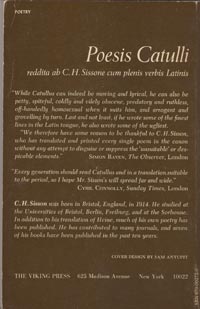May 3, 2011
The Poetry of Catullus translated by c.h.sisson
An Early Roman Poem by Gaius Valerius Catullus (ca. 84 BC – ca. 54 BC)

Egnatius, because he has white teeth,
Smiles all the time. In court,
When the lawyers are reducing everyone to tears,
He smiles. At a funeral,
When a mother is mourning the death of an only son,
He smiles Whatever is happening, anywhere,
Whatever he is doing, he smiles. He has this disease,
Not an elegant one, I think, nor very polite,
Let me give you a warning, Egnatius.
If you were a city man or a Sabine or Tiburtine,
A pig of an Umbrian or a fat Etruscan,
Or a dark Lanuvian with a fine set of teeth,
Or a Transpadane (not to forget my own people),
Or anyone else with a reasonable oral hygiene,
Still I shouldn’t really want you to smile all the time;
For nothing is stupider than a stupid smirk.
But your are a Celtiberian. Now the Celtiberians
Are accustomed to rub their teeth and gums every morning
With their matutinal micturtations,
So that, the more highly polished your teeth are,
We must assume, the more piss you drink.

Egnatius, quod candidos habet dentes,
renidet usquequaque, si ad rei ventumst
subsellium, cum orator excitat fletum,
renidet ille. si ad ii rogum fili
lugetur, orba cum flet unicum mater,
renidet ille. quicquid est, ubicumquest,
quodcumque agit, renidet, hunc habet morbum,
neque elegantem, ut arbitror, neque urbanum,.
quare monendum test mihi, bone Egnati,
si urbanus esses aut Sabinus aut Tiburs
aut porcus Umber aut obesus Etruscus
aut Lanuvinus ater atque dentatus
aut Transpadanus, ut meos quoque attingam,
aut quilubet, qui puriter lavit dentes,
tamen renidere usquequaque te nollem:
name risu inepto res ineptior nullast.
nunc Celtiber es: Celtiberia in terra,
quod quisque minxit, hoc sibi solet mane
dentem atque russam deficare gingivam;
ut quo iste verter expolitior dens est,
hoc te amplius bibisse praedicet loti.